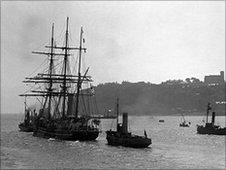Cardiff Bay service to mark Scott's polar expedition
- Published

Crowds turned out to cheer Scott and his explorers from Cardiff in June 1910
A service of thanksgiving has been held as part of the centenary commemorations of the departure of South Pole explorer Captain Robert Scott.
Capt Scott's fateful trip in the Terra Nova set sail from Cardiff 100 years ago this month.
Around 100 people were expected at the service at the Antarctic 100 memorial near the Norwegian Church in Cardiff Bay on Sunday.
The event was organised by the Cardiff-based Captain Scott Society.
Society chair Julian Salisbury said the Christian ethos was very much a part of Scott's expedition.
"Scott's second-in-command, Dr Edward Wilson, was very religious and maintained his Christian ethos throughout his suffering," said Mr Salisbury.
"We thought it fitting to hold a service of thanksgiving, just as one was held when the Terra Nova returned to the UK in June 1913, three years after the expedition set sail from Cardiff."
The service is just one of a series of events organised to commemorate the centenary of the expedition to be the first to the South Pole.
It ended in failure and the death of Scott and four of his fellow explorers on the return journey.
Last week the Royal Navy deep sea survey vessel named after the explorer, HMS Scott, docked in Cardiff after making soundings off Antarctica.
A centenary dinner is also being held in the Scott Room at Cardiff's Royal Hotel.
'Lot of interest'
On Tuesday, exactly 100 years to the day the Terra Nova sailed past Penarth head, the sail training tall ship Stavros Niarchos will recreate the departure.
The Stavros Niarchos out in Cardiff Bay <i>Photo: Henry Davis</i>
Among those taking part in this week's events are Jack Williamson, 93, from Swansea, whose father Thomas was a member of the first party sent out to look for Scott and his comrades who discovered their fate.
"There's been a lot of interest in the centenary," said Mr Salisbury. "Undoubtedly the story has lasted so long in the public consciousness because the Scott expedition ended so tragically.
"I think the language used by Captain Scott in the diary he kept as he was dying was so evocative and fluent that it has inspired anyone who has read it."
An exhibition about Scott's expedition which has been on show at the National Museum Cardiff will run at the National Waterfront Museum, Swansea, from 14 July until 10 October.
- Published7 June 2010